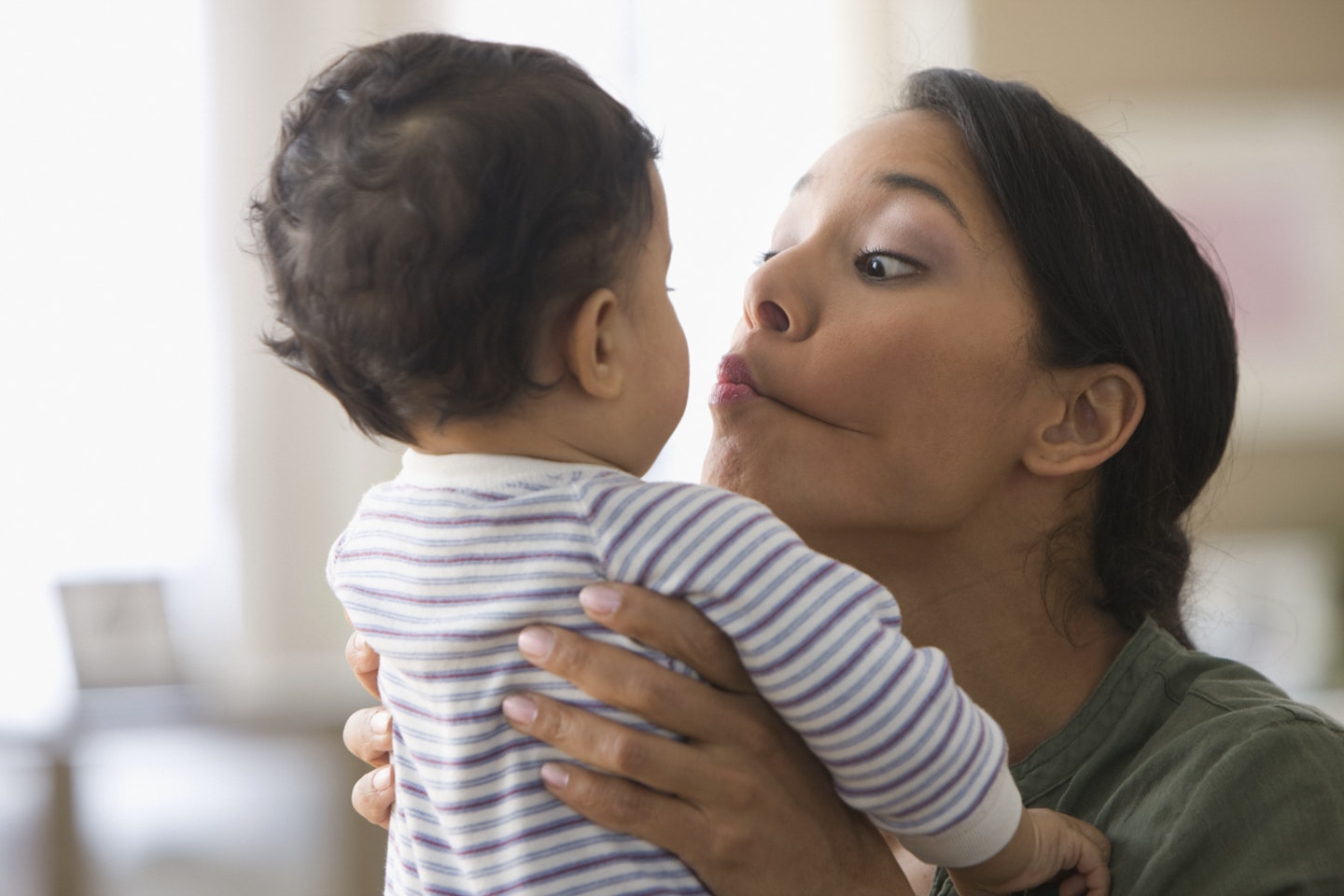Your 4-week-old baby has been in your life for almost one month and by now, you’ve probably begun to notice your baby reaching development milestones already as you start to get the hang of this whole parenting business. If you still have a lot of questions, don't worry – it's completely normal – we're here to tell you what you can expect from their week-by-week development when your baby is in their fourth week.
4-week-old baby physical development
By the four-week mark, your baby will start growing one inch per month and gaining 140-200 grams a week.
Their hearing is also fully developed after one month, which means they will begin to listen for the source of sounds and notice when you’re making loud noises around the room. With somewhat stronger neck muscles, they should start lifting their head briefly when they lie on their stomach and even turn it from side to side! You can encourage this with some tummy time.
Now they're past the three-week-old baby mark, their vision should be improving, as is their ability to focus. However, it takes a lot of effort to do this, so they may look cross-eyed at some points. To help this, hold something in front of their face and move it from side to side slowly, they should start to try and follow it.
4-week-old cognitive development
By now, your baby is starting to notice all the new things going on around them- including their hands and feet. Since they don’t understand that they are a different person from you, they are unlikely to know exactly what their hands or feet are, but soon they will be able to coordinate a bit better.
As well as being able to recognise sounds they heard in the womb - including the theme tune to your favourite TV show- they may also be able to recognise familiar faces now. It’s a great idea to hold up a mirror in front of them to make funny faces, then they can even start to recognise themselves. Don’t be too upset if they don’t recognise you though, as their memory is still only just developing properly.
Continue having conversations with your baby and allowing them to focus on your face and watch your facial movements. They should start copying them and even reaching out to your face soon enough. Around 4 weeks, they start to get excited as they recognise you and your partner, or family members. Just from observing you and listening to your voices, this will make every difference in their social development. They show excitement through widening their eyes and making noises in response to your actions but you'll have to wait a little while until their first baby smile.

4-week-old baby sleep
Your baby will be sleeping up to 18 hours a day for at least the first two months, of course, this will be throughout the day, not just when you want some shut-eye! You may be starting to feel the effects of new mum exhaustion at this point until baby starts sleeping through the night.
One great piece of advice is to perfect swaddling if you haven't already, as it creates the womb feeling they were so used to before bursting into the world.
How much should a 4-week-old baby be eating?
You may be settling into a better sleeping schedule now, which means fewer interruptions for eating. However, nighttime eating is still quite frequent for one-month-olds, so soldier on with those sleepless nights.
For a guideline feeding amount, weigh your baby and then feed them about 150ml-200ml per kilo. Although don’t worry if your baby seems to be overeating, she knows how much she should or shouldn’t eat at this stage and will only eat when she wants to. Whether your baby is breastfed or formula-fed, follow your baby's lead.
If you’re having trouble breastfeeding, it might be time to seek help and make sure there’s nothing else going on, so book an appointment with your GP and ask for some support as they will be able to advise on the best positions to try when breastfeeding.
How much should a 4-week-old baby be pooing?
Worried your baby isn’t regular enough? Don’t fret, as long as they’re going between one and ten times a day – plus wetting their nappy at least six times a day – they’re perfectly fine. You may want to check out a poo colour chart if you're concerned that something isn’t quite right with what you’ve been finding inside their nappy to put your mind at ease.
4-week-old baby milestones
Finding their fingers and toes: Your baby is starting to realise they have some handy attachments – their hands and feet! Don’t worry if they still seem oblivious to them though, as each baby will develop at their own pace.
Let the cooing commence: Finally, a break from the crying, your baby will realise they can make some other noises too. That means the cutest cooing sounds are bound to begin while you chat away to your baby.
Vision: At 4 weeks, your baby might be able to see much more clearly. They may now be able to see up to 18 inches in front of them, so keep holding their head close to your face like normal. You can expect their sight to develop even further into their fifth week of baby development.
Tight fists: Your baby will hold their hands in tight fists. This can be a sign that they're hungry. They tend to start to reach for things around now too, and their hands will fully open up by the time baby is eight weeks old. You will see how fascinated they are by their hands as they will stare at them. They should be discovering a lot about their bodies in their fourth week.
Head lifts: After their first month, you'll be seeing a lot of body changes and developments. By now you've probably noticed a loss of puffiness in their face. At this point, they will be able to hold their head up solo for a minute or two. Already a big change from weeks 2 and 3 with more control over their head as well as turning their necks from side to side.
Things to be aware of at 4-weeks
Dealing with colic: If your baby is crying for hours on end, three times a week for at least three weeks, they might be suffering from colic. It affects up to 40 per cent of babies, but that doesn’t make it any easier to deal with. Talk to your doctor if you notice your baby is crying for hours for no reason.
Sleep deprivation: You may be almost getting used to living off no sleep by now, but just in case you’re not, it's worth trying a change in your diet with some energy-boosting foods. Plus, some mummy beauty products to disguise all those sleepless nights!
Postnatal Depression: Your hormones should be settled by now and the baby blues finally over. If you’re still struggling with feelings of failure, or as though everything could go wrong and that it’s all your fault, you may be experiencing postnatal depression. With one in ten women experiencing postnatal depression, it’s something you must talk to your doctor about to ensure the best possible recovery. If you’re unsure whether you're experiencing postnatal depression or your baby blues hormones are clinging on, check out these key differences.
